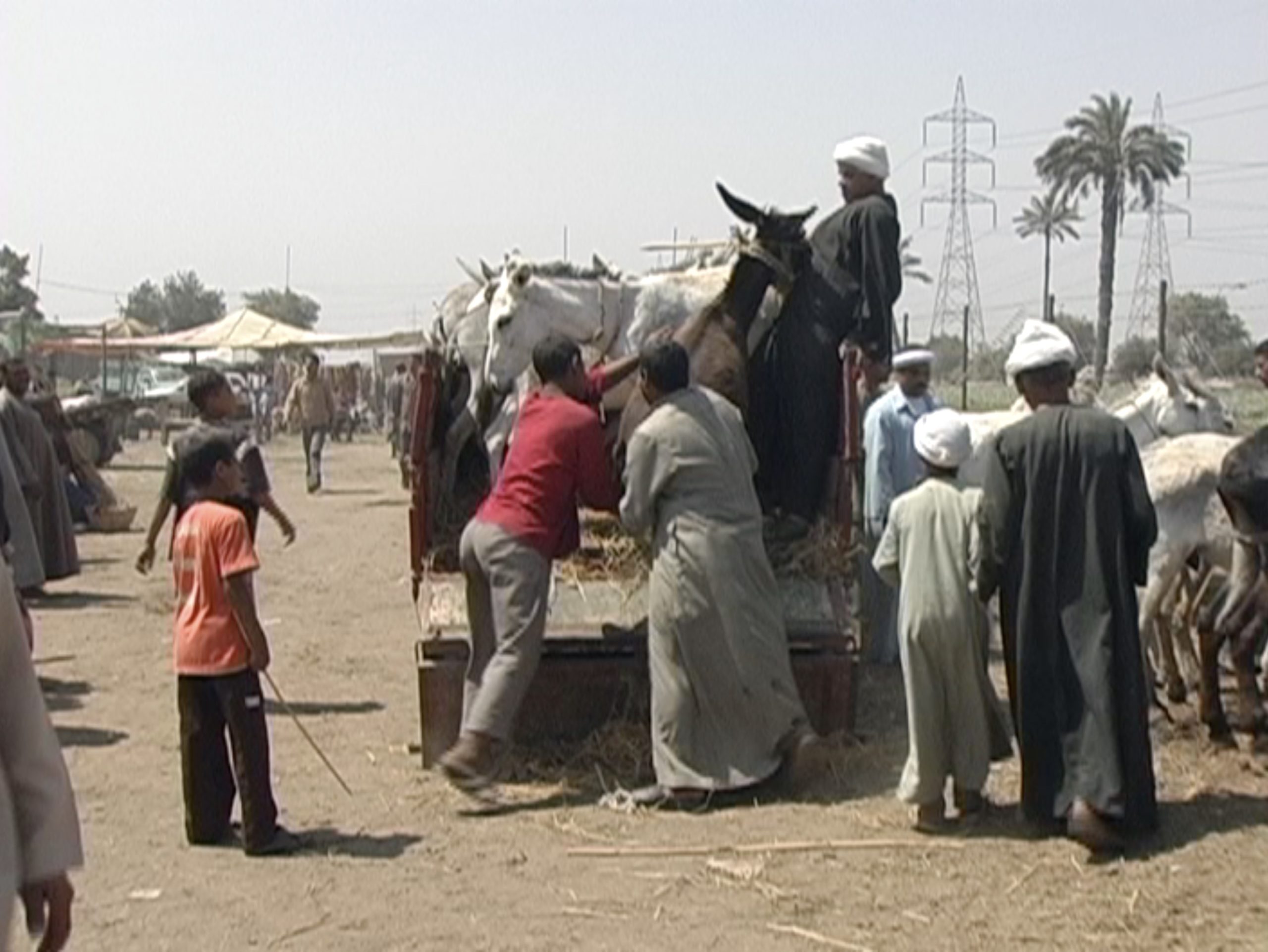On Friday 29th October 2021 LUX screens Born of the * * * On Zarathustra’s Going Under from Cairo to Oran, Third Part (2020) as part of screening series of cinema-gestures by Ayreen Anastas and Rene Gabri, curated by Azar Mahmoudian as part of the multi-chapter program of moving image practices, Sensible Grounds.
This is the third part of Ayreen Anastas and Rene Gabri’s attempt to revisit and unwork Anastas’s film initiated in 2007, which sought to translate and put into play Nietzsche’s “Thus Spoke Zarathustra” onto the contemporary Arab World. Rather than merely adapt or restage the ideas from this seminal work, the film instead continues an expanded effort to rethink life and art today through this encounter between gestures, insights, visions, prophecies drawn to this proper name Nietzsche and certain conditions, questions, afflictions attributed to territories demarcated as Arab. The film defies categorization, as it is neither essay nor performance, neither documentary nor fiction; it is instead an attempt at a clearing for something which is refused and refuses a designated place, people, time – yet it is what is most desired. Here are their preparatory notes towards the making of that film.
1. There is no Zarathustra or Nietzsche as such. They are ciphers, headings, suggestions – if not incoherent sometimes, at least inconsistent and contradictory; having given and having left certain suggestions, traces of their existence … utterances, texts, … we are left with a question concerning what we would like to do with them, or what do they do to us, how to use them? What do they help us do, undo, say, unsay today, ‘now’.
2. If there are any Nietzshean operations – which of them resonate for us and which among them allow themselves to be put into play in art and film.
3. We are not attempting to adapt Zarathustra to film or even projecting it into the ‘Arab World’ as much as we are attempting to put them into a more intense contact to see what may unfold:
Nietzsche + Cinema + Al A’alam Al Arabi (le Monde Arabe) = Z
To stage, to construct an encounter, a meeting, a situation.
4. To think through or with Nietzsche today is also to confront the great reach and impact he had on 20th century thought, which in turn has left its mark on us. To look for these marks with the meticulousness of an archeologist and the playfulness of a gay scientist.
5. What was it that Nietzsche opened for thinkers, artists and political actors of varying colors, persuasions, projects, struggles?
6. If, for Nietzsche, life has been accused judged and condemned [nihilism]; in short, denied; then, surely, [what is life, what is it to live, is it to affirm what is lived] what is at stake in life, in living, inhabits the center of our film.
7. But it should be asserted that the nihilism that Nietzsche meant to confront was not a specific brand, strain, mode of thinking or philosophy; it is, as our friend GD asserted, metaphysics – all which depreciates life in the name of a supra sensible world:
He does not make nihilism a historical event, it is rather the element of history as such, the motor of universal history … The meaning of history which at one time found its most adequate manifestation in Christianity … We cannot even say nihilism and its forms are categories of thought … of reasonable thought – identity, causality, finality – themselves presuppose an interpretation of force which is that of re-sentiment.
The instinct of revenge has gained such a hold on humanity over centuries that the whole of metaphysics, psychology, history and above all morality bear it’s imprint. As soon as man began thinking he introduced the bacillus of revenge into things.
The spirit of revenge is the genealogical element of our thought, the transcendental principle of our way of thinking.
Thus to struggle against the nihilism and the spirit of revenge =
… the end of metaphysics, the end of history as history of man, the transformation of the sciences [which has opposed knowledge to life]
What is a man if it would not accuse or depreciate existence… still a man?
For Nietzsche, the aim of philosophy: the freeing of thought from nihilism and it’s various forms.
To have ressentiment or not to have ressentiment – that is the difference.
Along these lines we could then ask within, through the film, what is a life no longer opposed, blamed, judged erroneous by knowledge. What is thinking when it is finally able to think not in terms of ressentiment, bad conscience?
A new thinking-living-art, affirmative, no longer guilty of existing. And if there is a question of will and willing – it is the will to live, to life, believing in the innocence of the future and the past, to believe in the eternal return.
8. What is an art that does not deny life and chance: the dice throw. To will, to live, to create, and GD adds that Nietzsche’s glad tidings are ‘tragic thought.’ For Nietzsche:
Affirmation is tragic because it affirms chance and the necessity of chance, because it affirms multiplicity and the unity of multiplicity.
All the rest is nihilism, Christian and dialectic pathos caricatures of the tragic, comedy of bad conscience.
9. In this way, we must ask with our film, how much ressentiment and bad conscience remain in our thinking living, art, … the ascetic ideal, the spirit of revenge, … do they continue to be at work … operative?
10. Are we able to also avoid immersing ourselves in the mystical body where ressentiment takes route; that is, interiority [the spider].
11. How to make art rid of this interiority, no longer drawing on needing, anguish, guilt, wailing, … all the forms of dissatisfaction.
12. Remember leaping is not dancing, betting is not playing [overcoming, going beyond]. Said in another manner, through such a way of making and unmaking film, we have managed to discover another game, another way of playing. We have managed to make chaos an object of affirmation [instead of positing it as something to be denied]. This could then be a touchstone of a difference between making a film on Nietzsche and making a film with him.



